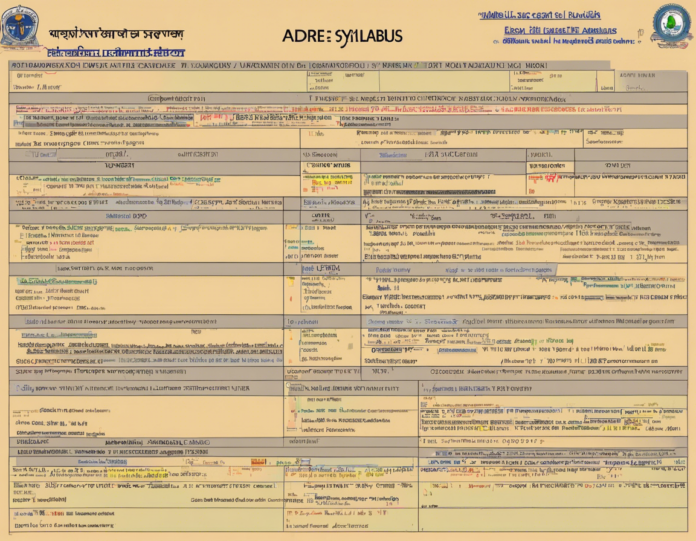As we gear up for the 2024 academic year, it’s essential for students to understand the Adre Syllabus to excel in their courses effectively and efficiently. A syllabus serves as a roadmap for the entire semester, outlining the course objectives, requirements, assignments, and expectations. In this comprehensive guide, we will delve into the Adre Syllabus 2024, breaking down essential components and tips for success.
Understanding the Adre Syllabus 2024
Course Information
The first section of the Adre Syllabus typically includes vital details like the course title, code, instructor information, office hours, contact information, and possibly a brief course description. It’s crucial to carefully review this section to identify key course logistics and understand the instructor’s expectations.
Course Objectives and Learning Outcomes
Course objectives outline what students are expected to accomplish by the end of the course. These objectives are often tied to specific learning outcomes, defining the knowledge and skills students should have acquired. Understanding these outcomes will guide your focus during the semester.
Grading Policy
The grading policy section outlines how your performance will be assessed throughout the course. It typically includes information on the weightage of assignments, exams, participation, and any other relevant criteria. Pay close attention to this section to strategize your approach for earning a good grade.
Assignments and Deadlines
This section of the syllabus details all assignments, projects, readings, and deadlines for the semester. Make note of these dates in your planner or calendar to stay organized and prioritize your work effectively. Procrastination can be a major hurdle to academic success – stay ahead by planning ahead!
Course Policies
Course policies cover essential guidelines regarding attendance, late submissions, academic integrity, technology usage in class, and any other specific rules the instructor has established. Adhering to these policies is crucial for maintaining academic integrity and fostering a positive learning environment.
Required Texts and Materials
In this section, you will find information on the required textbooks, readings, software, or other materials necessary for the course. Make sure to acquire these materials promptly to avoid falling behind on your assignments and coursework.
Office Hours and Support
Your instructor’s office hours provide an opportunity for one-on-one clarification, additional help, or discussion of course materials. Take advantage of these sessions to deepen your understanding of the subject matter and build a rapport with your professor.
Course Schedule
The course schedule outlines the topics, readings, assignments, and exams on a week-by-week basis. Use this schedule to plan your study sessions, track your progress, and ensure you are pacing yourself effectively throughout the semester.
Tips for Success with the Adre Syllabus 2024
Review the Syllabus Thoroughly
Take the time to thoroughly go through the Adre Syllabus at the beginning of the semester. Understanding the course requirements, expectations, and deadlines from the outset will set you up for success.
Create a Study Plan
Use the course schedule provided in the syllabus to create a study plan for the semester. Allocate dedicated time for readings, assignments, and exam preparation to stay on track with your coursework.
Communicate with Your Instructor
If you have any questions or need clarification on any aspect of the syllabus or course material, don’t hesitate to reach out to your instructor. Effective communication can prevent misunderstandings and help you succeed academically.
Stay Organized
Organization is key to managing your workload effectively. Use tools like calendars, planners, or digital apps to track assignments, deadlines, and upcoming exams. Stay ahead of your work to avoid last-minute stress.
Engage Actively in Class
Participating actively in class discussions, group activities, and lectures can enhance your understanding of the course material. Engage with the content, ask questions, and contribute to a vibrant learning environment.
FAQs (Frequently Asked Questions)
1. What should I do if I can’t access the required course materials listed in the syllabus?
If you are unable to access the required course materials, reach out to your instructor immediately to seek alternative solutions or resources.
2. How important is it to follow the deadlines mentioned in the syllabus?
Adhering to deadlines is crucial for demonstrating your time management skills and commitment to your academics. Late submissions may result in grade deductions or penalties.
3. Can I request a syllabus adjustment if I have a scheduling conflict?
While some instructors may be accommodating under special circumstances, requesting syllabus adjustments for personal scheduling conflicts is typically challenging. It’s advisable to communicate any conflicts early in the semester.
4. What should I do if I have concerns about the grading policy outlined in the syllabus?
If you have concerns about the grading policy, discuss them with your instructor to seek clarification or address any issues. It’s essential to understand the evaluation criteria to perform well in the course.
5. How can I make the most of my instructor’s office hours?
Prepare specific questions or topics you’d like to discuss before attending your instructor’s office hours. Engage in meaningful conversations, seek clarification on course material, and utilize this time for academic support.
In conclusion, familiarizing yourself with the Adre Syllabus 2024 and actively engaging with its contents will set a strong foundation for your academic success. Remember to stay organized, communicate effectively, and seek support when needed to make the most of your learning experience. Embrace the journey ahead with enthusiasm and a proactive mindset to excel in your courses.

